LC-R127R2P Battery Chargers: Core Functional Technologies and Application Development Cases
The LC-R127R2P is a sealed lead-acid (SLA) battery widely utilized in applications such as uninterruptible power supplies (UPS), emergency lighting, and backup power systems. To ensure optimal performance and longevity of these batteries, the design and functionality of their chargers are critical. Below, we explore the core functional technologies of battery chargers and relevant application development cases that enhance their effectiveness.
Core Functional Technologies of Battery Chargers
| 1. Smart Charging Technology | |
| 2. Temperature Compensation | |
| 3. Pulse Charging | |
| 4. Battery Management Systems (BMS) | |
| 5. Safety Features | |
| 6. User Interface and Connectivity | |
| 1. Uninterruptible Power Supplies (UPS) | |
| 2. Solar Energy Storage Systems | |
| 3. Electric Mobility Solutions | |
| 4. Emergency Lighting Systems | |
| 5. Telecommunications Backup Systems | |
| 6. Medical Equipment | |
Application Development Cases
Conclusion

The effectiveness of battery chargers for the LC-R127R2P and similar lead-acid batteries is significantly enhanced by the integration of advanced technologies and application-specific designs. By focusing on smart charging, safety features, and tailored solutions for various industries, manufacturers can develop chargers that not only improve battery performance but also extend their lifespan and reliability. As technology continues to advance, the development of more efficient and intelligent charging solutions will be pivotal in the future of battery management, ensuring that critical systems remain powered and operational.
LC-R127R2P Battery Chargers: Core Functional Technologies and Application Development Cases
The LC-R127R2P is a sealed lead-acid (SLA) battery widely utilized in applications such as uninterruptible power supplies (UPS), emergency lighting, and backup power systems. To ensure optimal performance and longevity of these batteries, the design and functionality of their chargers are critical. Below, we explore the core functional technologies of battery chargers and relevant application development cases that enhance their effectiveness.
Core Functional Technologies of Battery Chargers
| 1. Smart Charging Technology | |
| 2. Temperature Compensation | |
| 3. Pulse Charging | |
| 4. Battery Management Systems (BMS) | |
| 5. Safety Features | |
| 6. User Interface and Connectivity | |
| 1. Uninterruptible Power Supplies (UPS) | |
| 2. Solar Energy Storage Systems | |
| 3. Electric Mobility Solutions | |
| 4. Emergency Lighting Systems | |
| 5. Telecommunications Backup Systems | |
| 6. Medical Equipment | |
Application Development Cases
Conclusion

The effectiveness of battery chargers for the LC-R127R2P and similar lead-acid batteries is significantly enhanced by the integration of advanced technologies and application-specific designs. By focusing on smart charging, safety features, and tailored solutions for various industries, manufacturers can develop chargers that not only improve battery performance but also extend their lifespan and reliability. As technology continues to advance, the development of more efficient and intelligent charging solutions will be pivotal in the future of battery management, ensuring that critical systems remain powered and operational.













